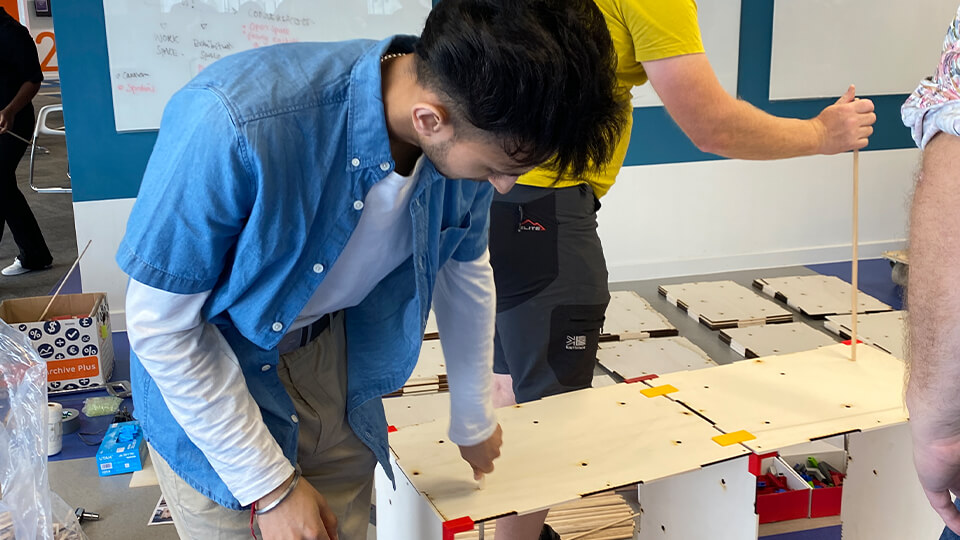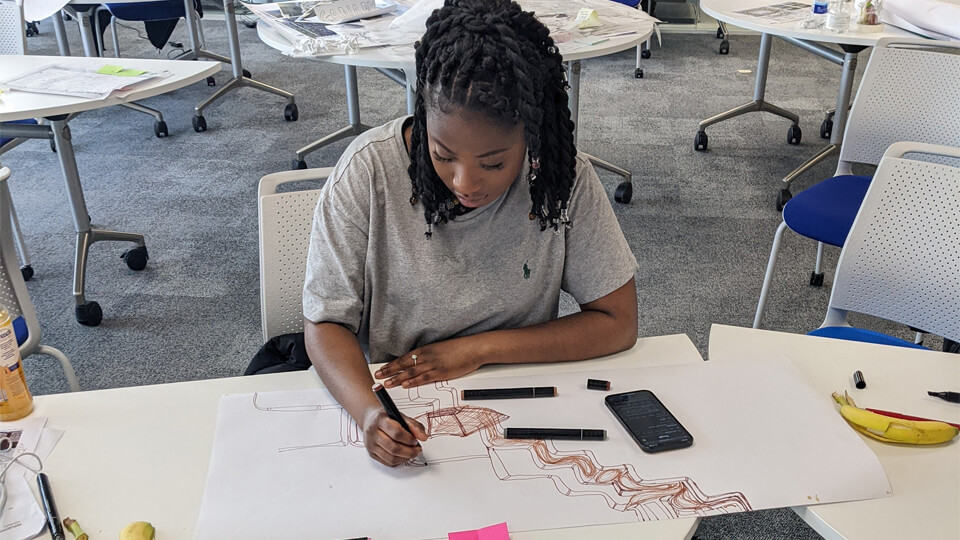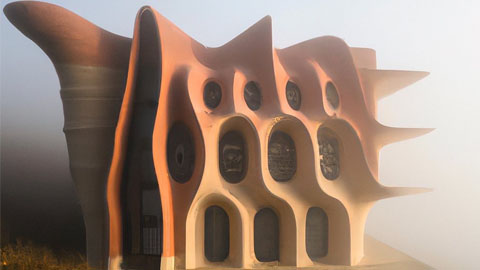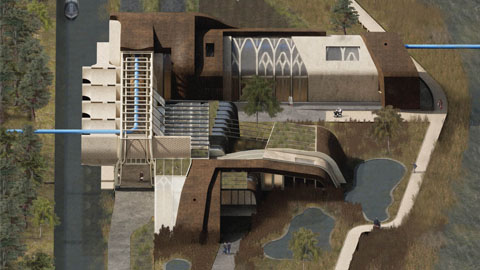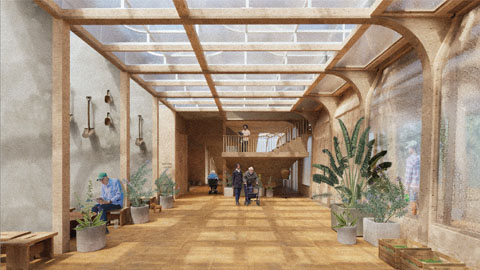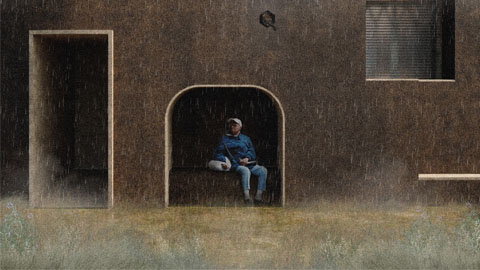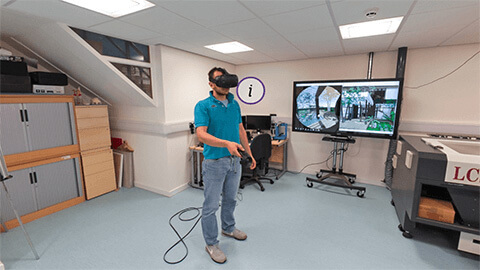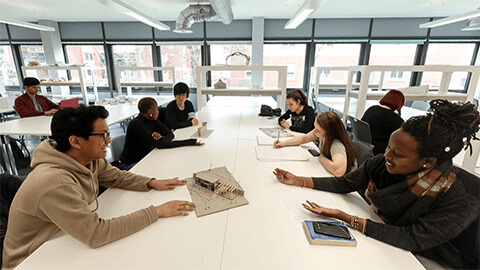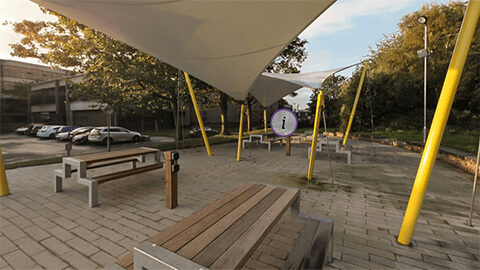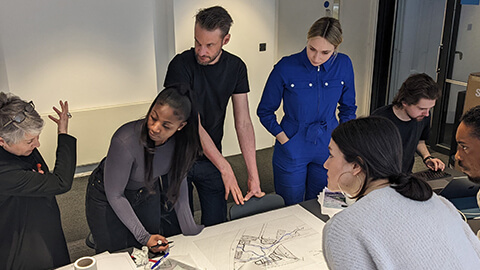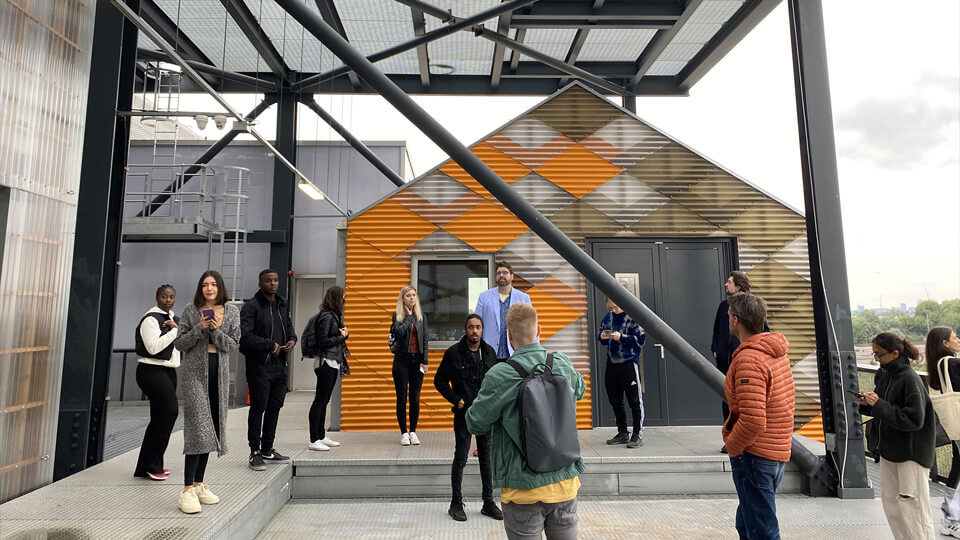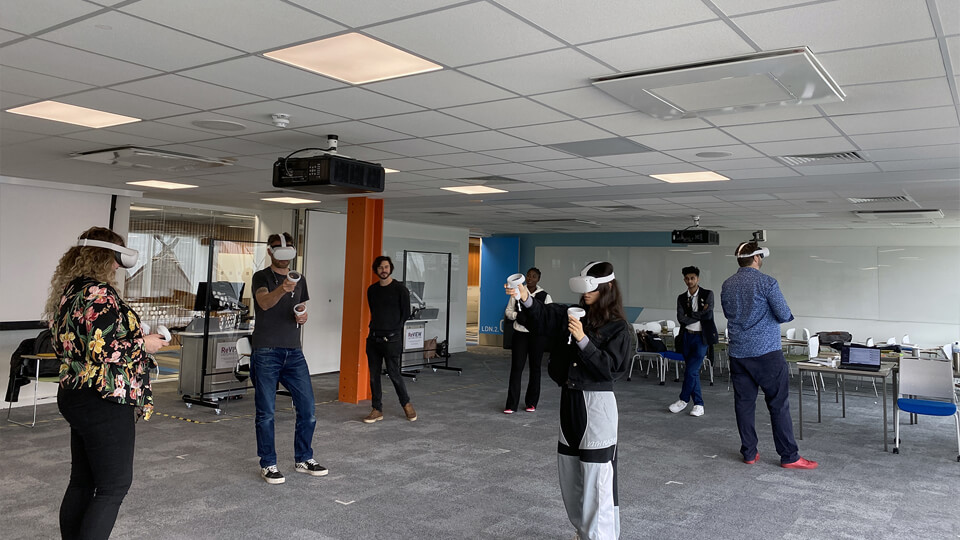Architecture (Professional)
Qualification(s) available: MArch
- Fees for the 2026-27 academic year
-
UK: £9,790International: £30,700
- Entry requirements
- 2:1
- Full-time
- 2 years
- Part-time
- Not available
- Location
- Loughborough
- Start date
- September 2026
- Department
- Architecture, Building and Civil Engineering
The MArch Architecture (Professional) programme expands the ‘hands-on’ ethos of our highly esteemed BArch Architecture course to integrate industry and research further as the next step in your development as an architect. Accredited by both RIBA and ARB you will engage with the very latest thinking and technologies in architecture and urban design to foster innovative applications for our global future. The programme has been developed according to the new accreditation framework and ARB’s Academic competency Outcomes.
The programme is structured around a student-centred learning approach and ‘research by design’ pedagogy that provides a flexible framework from which you can deliver design experimentation and entrepreneurial thinking by taking advantage of the broad ecosystem of actors and resources that our integrated design lab approach affords.
The programme is delivered at our Loughborough campus across both years of study. Teaching combines lectures and studio‑based learning, supported by several practice visits and residential study trips that enhance your engagement with contemporary architectural contexts. Throughout the course, you will have full access to dedicated studio spaces, VR and digital fabrication labs, and over 3,000m² of specialist workshops, enabling the development, construction, and testing of full‑scale design prototypes. We also use our London Campus as a base for trips and seminars.
A central focus of the programme is the second year (M2) research‑led design module that integrates the dissertation, technical appraisal and global future modules into a holistic, studio‑based approach to architectural design and entrepreneurship. This framework encourages rigorous inquiry, innovation, and the development of new design responses to global challenges.
Design projects focus on specialised areas of design research to establish a unique identity for each project, allowing you to test speculative lines of enquiry as part of an iterative and reflective design process. This provides opportunities to develop visionary, technically grounded and robust design propositions. Each student has an allocated workspace, which allows cross-fertilisation of ideas for the formation of a lively, tight-knit creative culture.
Loughborough University holds an annual Architecture End of Year Show to celebrate the year's achievements and showcase student work across all years to practitioners interested in hiring our students and graduates.
Why you should choose us
Why you should study this degree
- You will have access to our first-class facilities, including our dedicated design studio space and 3,000m2 of workshop space at our Loughborough campus.
- The programme is accredited by the ARB under its new ‘Tomorrows Architects’ accreditation framework and validated by RIBA.
- The programme offers a major focus on research-led design labs.
- Industry partners, including Sheppard Robson, Fletcher Priest Architects, Glenn Howells Architects, Player Roberts Bell Architects, and Francesco Pierazzi Architects, deliver guest lectures and design studio workshops.
Using LU-ARC’s open M1 research framework, I was given the freedom to push and showcase machine learning (ML) as a creative architectural design collaborator. LU-ARC offers the perfect option to prospective students who are prepared to drive their own ambitions within a supported network of professional help.
Professional recognition
Loughborough’s MArch programme has accreditation by the Architects Registration Board (ARB) under the ‘Tomorrows Architects’ Framework (subject to the University meeting the ARB’s ongoing accreditation conditions). It provides exemption from the first stages of ‘Academic Outcomes’ required to qualify and register as an architect* under the ARB Framework. It also has validation by the Royal Institute of British Architects (RIBA).
*Applicants should note that under the current transitional arrangements, that prior to 2028, candidates without a Part 1 qualification (e.g. a Bachelor of Architecture degree) will still need separately to obtain a Part 1 qualification by professional examination, and demonstrate the ‘Practice Outcomes’ to enable registration with the ARB and RIBA.
What you'll study
The following information is intended as an example only and is typically based on module information for the 2025/26 year of entry. Modules are reviewed on an annual basis and may be subject to future changes. Updated Programme and Module Specifications are made available ahead of each academic year. Please also see Terms and Conditions of Study for more information.
The programme is delivered over two years of full-time study. Teaching, learning and assessment is at postgraduate level (Level 7) but follows the undergraduate teaching year and Regulations. Primarily delivered through the ‘Design Studio’ this programme it is suitable for those who have a strong interest in driving self-led research by design. Our approach allows students to develop their personal interests (e.g. AI, ecological design, etc), whilst ensuring a comprehensive approach to professional learning and competency.
Year 1
Semester 1 and 2
Reflective Practice (20 credits)
The aims of this module are for the students to:
- Examine the opportunities, constraints and realities of professional practice.
- Recognise and demonstrate the architect's responsibility to society.
- Analyse procurement, contracts and management processes and the role of architect as an agent and stakeholder within them.
- Apply critical evaluation of architectural practice, its modes and processes of operation both as public service and business.
- Demonstrate understanding of the specific requirements of a role within practice to include observations on issues including leadership, prioritisation, crisis management and ethics.
Contemporary Cities: Theory and Design (20 credits)
On successful completion of this module students will be able to:
- Debate the contribution of architectural and urban design theories towards the creation of sustainable urban futures.
- Demonstrate an understanding of contemporary urban challenges as multi-dimensional issues by applying complex analytical thinking through cross-disciplinary lenses.
- Demonstrate a social, ethical, cultural and ecological awareness of the impacts of design across a range of cultural contexts, settlement types and scales.
- Evaluate the use of practical and speculative design tools as currently applied in the professional remit for the design and production of urban form.
Transdisciplinary Design (20 credits)
On successful completion of this module students will be able to:
- Discuss complex multi-disciplinary and multi-stakeholder contributions relative the broader landscape of design thinking.
- Synthesise theoretical models to develop novel conceptual and practical interpretations of design systems, products, spaces and places.
- Examine models of users and occupiers and their spatial relationships through transdisciplinary methodologies of spatial agency and cognition, experience design, behavioural studies, psychology and phenomenology.
- Evaluate new and emergent technologies and their potential contributions and uses in design.
- Demonstrate experimental design and prototyping by crafting bespoke methods, tools and/or 'making' processes.
Design Studio M1 (60 credits)
On successful completion of this module students will be able to:
- Apply the knowledge and skills gained in previous architectural education and practice experience to design propositions with increased complexity offering a more detailed technical resolution, whilst addressing issues of urban design and placemaking.
- Demonstrate originality of thought the definition of architectural problems design solutions.
- Produce architectural drawings and documentation that communicates architectural design proposals in line with expected industry standards.
- Demonstrate a holistic approach to and understanding of the complex relationships that exist between technical challenges and design considerations in the delivery of architecture and built environment practice.
- Mobilise their experience in architectural practice to develop their critical thinking in design and their understanding of social, economic, cultural and environmental impact of architecture.
- Demonstrate understanding of the regulatory, legislative and ethical context for their project.
Year 2
Semester 1 and 2
Design Studio M2 (70 credits)
The aims of this module are for the students to:
- Illustrate their innovative and imaginative architectural thinking by demonstrating originality in problem definition and solving, pushing boundaries of current architectural practices.
- Apply a mix of design research methods through speculative modes of inquiry to evidence an original and comprehensive research-led architectural proposition from the urban-scale to the detail scale.
- Formulate an ambitious, layered and appropriate brief that responds to an in-depth investigation of a specific area of architectural research.
- Synthesize the knowledge and skills learnt in previous years to construct a creative, convincing and rigorous design proposition of an increased scope and complexity to an advanced level of detailed and professional resolution.
- Evaluate architectural, tectonic and environmental options to infer an integrated design approach and well-developed understanding of the building's technical performance.
- Argue their own architectural standpoint through a clear articulation of a self-guided exploration and proposition in response to an individually defined design problem that pertains to the complex and multi-layered environment of contemporary practice.
- Interpret the complex relationships between external form and interior spatial programming by proposing an urban scale intervention in the form of multiple buildings with surrounding external spaces and landscape.
- Critically assess their design propositions with wider issues of social, economic, ethical and environmental demands in relationship to the client, user and public in a global and local context.
Research Dissertation (30 credits)
Develop the competencies to design, research and deliver an original and rigorous piece of architecture- related research, including:
- Compose coherent and deliverable aims and objectives.
- Select and apply correct research methodologies.
- Locate, analyse and synthesize research literature from a diverse variety of sources.
- Synthesize, evaluate and model information and data.
- Construct a coherent and sustained narrative of argument with a rational and compelling conclusion.#
- Present `work-in-progress in live interactive critical forums.
- Understand the mutually beneficial interdependency of research and architectural design.
- Understand the inter-relationship between people, buildings and the environment and to become aware of and to investigate the impacts of the built environment on social practices and relationships of various groups and individuals.
- Demonstrate an ability to appraise critically the spatial, aesthetic, technical and social qualities of a design within the scope and scale of a wider environment.
Global Futures: Climate and Architecture (20 credits)
The aims of this module is to:
- Understand the climate factors that are a determinant of building performance and energy usage and how those are affected by climate change.
- Apply the principles of predictive modelling for building performance and energy usage across a range of scales from individual buildings to cities.
- Construct and analyse urban modelling studies using appropriate tools.
Semester 2
Technical Appraisal (10 credits)
This module is intended to complement and support the M2 Design Studio project, providing an opportunity for students to clearly and coherently articulate the structural, material and technical resolution of their design scheme.
Students will have the opportunity to demonstrate detailed consideration of contemporary aspects of construction legislation as well as broader strategic consideration of aspects regenerative, and sustainable building design, and building safety and construction processes throughout the building’s life cycle from construction to demolition.
How you'll be assessed
You will be assessed by a combination of essays, reports, individual and group presentations and installations, project-based portfolios, and a dissertation on an agreed topic.
How you'll study
- Lectures
- Seminars
- Tutorials
- Field trips
- Independent study
- Group work
- Supervision
- Workshops
- Laboratory work
- Practical sessions
- Flexible learning
- Online tutorials
- Virtual learning
- Access to online material
Students' project work
Where you'll study
Our Architecture degrees have their own dedicated building, the Keith Green building, as well as studio spaces in the University’s Sir David Davies building, where you will have your own workspace to conduct your studies.
The buildings front an open green space which operates as an interactive test ground for architectural interventions. You will also have access to our outstanding 3,000m2 laboratory, where you will test and explore ideas using traditional workshops, digital fabrication tools and research labs.
Entry requirements
Our entry requirements are listed using standard UK undergraduate degree classifications i.e. first-class honours, upper second-class honours and lower second-class honours. To learn the equivalent for your country, please choose it from the drop-down below.
Entry requirements for United Kingdom
A portfolio submission and interview will form part of the admissions process for candidates that have earned a first or 2:1 on their Part 1 architecture degree (or equivalent, if international) or relevant discipline (for example, architectural engineering, or urban design).
In case where an exceptional portfolio and interview score is achieved by a candidate with a 2:2 from with an Architecture degree, an offer may be made.
To undertake the MArch, all students must complete the entire course with Loughborough University. Candidates should note that there is no provision for direct entry to the second year of the course, nor is there any opportunity to study abroad at another University for any period of the course.
MArch Portfolio Guidance
Your design portfolio should be a single pdf document with a maximum of 30 pages and maximum size of 50MB. The portfolio should clearly communicate your creative and design skills applied to architectural and/or urban design projects. We look for a breadth of conceptual thinking, a rigorous design process and creative architectural propositions which challenge conventional practices and push the boundaries of architectural thinking. Showcasing a wide range of ways in which you explore architectural elements and representational skills from hand to digital is beneficial.
Application deadline: July 31st
Afghanistan
| First-class honours (70%) | Upper second-class honours (60%) | Lower second-class honours (50%) | |
|---|---|---|---|
| Masters | 95% | 85% | 70% |
Albania
| First-class honours (70%) | Upper second-class honours (60%) | Lower second-class honours (50%) | |
|---|---|---|---|
| Diplomë e Nivelit të Pare (First Level (University) Diploma (from 2010) | 9.5 | 8.5 | 8 |
Algeria
| First-class honours (70%) | Upper second-class honours (60%) | Lower second-class honours (50%) | |
|---|---|---|---|
| Licence (4 year) / Diplome d'Inginieur d'Etat / Diplôme d'Etudes Supérieures | 16 | 14 | 12 |
Argentina
| First-class honours (70%) | Upper second-class honours (60%) | Lower second-class honours (50%) | |
|---|---|---|---|
| Licenciatura/ Licenciado (4 year) | 8.5 | 7.5 | 6.0 |
Armenia
| First-class honours (70%) | Upper second-class honours (60%) | Lower second-class honours (50%) | |
|---|---|---|---|
| Bakalavri Kochum required but typically a Magistrosi Kochum | 90% or 3.9 | 80% or 3.5 | 70% or 3.0 |
Australia
| First-class honours (70%) | Upper second-class honours (60%) | Lower second-class honours (50%) | |
|---|---|---|---|
| Honours degree (AQF level 8) | First Class, 80% | Upper Second, 70%, H2A | Lower Second, 60%, H2B |
| Ordinary degree - AQF Level 7 pass (mark 46 or 50) | High Distinction (80% or 85%) | Distinction (75% or 80%) | Distinction (70% or 75%) |
Austria
| First-class honours (70%) | Upper second-class honours (60%) | Lower second-class honours (50%) | |
|---|---|---|---|
| Degree / Diplomstudium / Fachhochschuldiplom (Diplom (FH)) | A (or 1.5) mit Auszeichnungbestanden | 60% / B / (or 2) | 60% / B / (or 2) |
Azerbaijan
| First-class honours (70%) | Upper second-class honours (60%) | Lower second-class honours (50%) | |
|---|---|---|---|
| Bakalavr Diplomu/ Diplomu (Specialist Diploma) | 4.5 or 90% | 4 or 80% | 3.5 or 70% |
Bahamas
| First-class honours (70%) | Upper second-class honours (60%) | Lower second-class honours (50%) | |
|---|---|---|---|
| Degree from University of the West Indies only | 1st (GPA 3.6) | 2:1 (GPA 3.0) | 2:2 (GPA 2.5) |
Bahrain
| First-class honours (70%) | Upper second-class honours (60%) | Lower second-class honours (50%) | |
|---|---|---|---|
| GPA 4.0 scale | 3.5 | 3.0 | 2.5 |
Bangladesh
| First-class honours (70%) | Upper second-class honours (60%) | Lower second-class honours (50%) | |
|---|---|---|---|
| 4 Year Bachelor of Science in Engineering (IEB and BAETE accredited courses up to 2024) Any 4 year Bachelor degree or BSc in Nursing (2025 onwards) |
1st (70%) / 3.5 | 2nd (60%) / 3.0 | 2nd (55%) / 2.75 |
| Masters (1-2 years) following a 3 or 4 year degree | 80% / 4.0 | 65% / 3.25 | 50% / 2.5 |
Belarus
| First-class honours (70%) | Upper second-class honours (60%) | Lower second-class honours (50%) | |
|---|---|---|---|
| Specialist Diploma (5Yr) | 9 | 7 | 5 |
Belgium
| First-class honours (70%) | Upper second-class honours (60%) | Lower second-class honours (50%) | |
|---|---|---|---|
| Bachelor degree/Licenciaat/Licencie | 80% or 17 | 70% or 14 | 60% or 12 |
Belize
| First-class honours (70%) | Upper second-class honours (60%) | Lower second-class honours (50%) | |
|---|---|---|---|
| Degree from University of the West Indies only | 1st (GPA 3.6) | 2:1 (GPA 3.0) | 2:2 (GPA 2.5) |
Benin
| First-class honours (70%) | Upper second-class honours (60%) | Lower second-class honours (50%) | |
|---|---|---|---|
| Maitrise | 18 | 15 or Bien | 12 or Assez Bien |
Bermuda
| First-class honours (70%) | Upper second-class honours (60%) | Lower second-class honours (50%) | |
|---|---|---|---|
| Degree from University of the West Indies only | 1st (GPA 3.6) | 2:1 (GPA 3.0) | 2:2 (GPA 2.5) |
Bolivia
| First-class honours (70%) | Upper second-class honours (60%) | Lower second-class honours (50%) | |
|---|---|---|---|
| A Licenciado, 4 years Private (public/private) | 85/78 | 75/66 | 67/55 |
Bosnia and Herzegovina
| First-class honours (70%) | Upper second-class honours (60%) | Lower second-class honours (50%) | |
|---|---|---|---|
| Diploma Visokog Obrazovanja / Diplomirani | 10 | 9 | 8 |
Botswana
| First-class honours (70%) | Upper second-class honours (60%) | Lower second-class honours (50%) | |
|---|---|---|---|
| Master's degree | A or 80% | B or 70% | C or 60% |
Brazil
| First-class honours (70%) | Upper second-class honours (60%) | Lower second-class honours (50%) | |
|---|---|---|---|
| Brazil - 4 yr Bacharel or Licenciado/Licenciatura or Título Profissional | 8.5 | 7.5 | 6.5 |
Brunei
| First-class honours (70%) | Upper second-class honours (60%) | Lower second-class honours (50%) | |
|---|---|---|---|
| Brunei | First | Upper Second (60%/B/3.1) | Lower Second (50% or C or 2.5) |
Bulgaria
| First-class honours (70%) | Upper second-class honours (60%) | Lower second-class honours (50%) | |
|---|---|---|---|
| 5 yr Diploma za Zavarsheno Visshe Obrazovanie (Diploma of Completed Higher Education) | 6 | 5 | 4 |
Burundi
| First-class honours (70%) | Upper second-class honours (60%) | Lower second-class honours (50%) | |
|---|---|---|---|
| Masters or Diplôme d'Études Approfondies or Diplôme Ingénieur (professional title) | 18 | 15/20 (Bien) | 12.5/20 (Assez Bien) |
Cambodia
| First-class honours (70%) | Upper second-class honours (60%) | Lower second-class honours (50%) | |
|---|---|---|---|
| Masters | 80% or B+ or 3.5 | 70% or B or 3.0 | 60% or C+ or 2.5 |
Cameroon
| First-class honours (70%) | Upper second-class honours (60%) | Lower second-class honours (50%) | |
|---|---|---|---|
| Bachelor degree or Diplome d'Etudes Superiures de Commerce or Diplome d'Ingenieur or Diplôme d'Ingénieur de Conception or a Maitrise, 4 year Licence or Master 1 (M1) | 1st / 3.6 or 15/Tres Bien | 2:1 / GPA 3.0 or 14 / Bien | 2:2 / GPA 2.5 or 12.5/ Assez Bien |
Canada
| First-class honours (70%) | Upper second-class honours (60%) | Lower second-class honours (50%) | |
|---|---|---|---|
| GPA 4.0/Percentage | 3.7/85% | 3.3/75% | 2.7/68% |
| Out of 9 | 8 | 6 | 5 |
| Out of 12 | 10 | 8 | 6 |
Chile
| First-class honours (70%) | Upper second-class honours (60%) | Lower second-class honours (50%) | |
|---|---|---|---|
| Grado de Licenciado / Título (Profesional) de [subject area] (4 years) | 6 | 5.5 | 5 |
China
Students are required to have a bachelor degree (4 years) for entry to a postgraduate programme. The University uses a tiered ranking system to identify the required final mark, as outlined on the table below.
You can search for your institution (university or affiliated college) via our look up tool.
| First class (70%) | Mid 2:1 (65%) | 2:1 (60%) | Mid 2:2 (55%) | 2:2 (50%) | |
|---|---|---|---|---|---|
| Tier 1 | 80% | 76% | 72% | 70% | 67% |
| Tier 2 | 83% | 79% | 75% | 73% | 70% |
| Tier 3 | 86% | 82% | 79% | 77% | 75% |
Colombia
| First-class honours (70%) | Upper second-class honours (60%) | Lower second-class honours (50%) | |
|---|---|---|---|
| Licenciado / Título de [subject area] | 4.5 | 3.75 | 3.2 |
Costa Rica
| First-class honours (70%) | Upper second-class honours (60%) | Lower second-class honours (50%) | |
|---|---|---|---|
| Licenciado | 9 | 8 or 80 | 7 or 75 |
Croatia
| First-class honours (70%) | Upper second-class honours (60%) | Lower second-class honours (50%) | |
|---|---|---|---|
| Baccalaureus / Prvostupnik | 4.5 | 3.8 | 3.0 |
Cuba
| First-class honours (70%) | Upper second-class honours (60%) | Lower second-class honours (50%) | |
|---|---|---|---|
| 4-year Titulo de Licenciado / Licenciatura | 5 | 4 | 3 |
Cyprus
| First-class honours (70%) | Upper second-class honours (60%) | Lower second-class honours (50%) | |
|---|---|---|---|
| Cyprus | 8.5 | 7.0 | 6.5 |
Czech Republic
| First-class honours (70%) | Upper second-class honours (60%) | Lower second-class honours (50%) | |
|---|---|---|---|
| Bakalár (after 2001) 6 yr integrated Magistr | 1 | 1.5 | 2 |
Denmark
| First-class honours (70%) | Upper second-class honours (60%) | Lower second-class honours (50%) | |
|---|---|---|---|
| 5 year Candidatus/Candidata Magisterii or Bachelor degree (7 point scale) | 12 | 10 | 7 |
Dominican Republic
| First-class honours (70%) | Upper second-class honours (60%) | Lower second-class honours (50%) | |
|---|---|---|---|
| 4 year Licenciado or Título de [subject area] | 3.8 | Magna Cum Laude or 3.5 or 85% | Cum Laude or 3.2 or 82% |
Ecuador
| First-class honours (70%) | Upper second-class honours (60%) | Lower second-class honours (50%) | |
|---|---|---|---|
| Título de Licenciado / Título de [subject area] | 8.5 / 85% | 8 / 80% | 7 / 70% |
Egypt
| First-class honours (70%) | Upper second-class honours (60%) | Lower second-class honours (50%) | |
|---|---|---|---|
| Egypt | 3.5 | 3.2 | 2.8 |
| Universities only | BA 90%, BSc 85% | BA 80%, BSc 75% | BA 65%, BSc 65% |
El Salvador
| First-class honours (70%) | Upper second-class honours (60%) | Lower second-class honours (50%) | |
|---|---|---|---|
| 5 year Licenciado, Título de Ingeniero/Arquitecto | 8.5, 85% | 7.5, 75% or Muy Bueno | 6.5, 65% or Bueno |
Estonia
| First-class honours (70%) | Upper second-class honours (60%) | Lower second-class honours (50%) | |
|---|---|---|---|
| Bakalaureusekraad or Magister or Magistrikraad | 5 or 91% or A | 4 or 81% or B | 3 or 71% or C |
Ethiopia
| First-class honours (70%) | Upper second-class honours (60%) | Lower second-class honours (50%) | |
|---|---|---|---|
| Masters (up to 2025) | A / GPA 4.0 | A / GPA 3.5 | B / GPA 2.8 |
| 4-year Bachelor degree with thesis (from 2024) | A / GPA 4.0 | A / GPA 3.5 | B / GPA 2.8 |
| 5-year Bachelor degree (from 2025) | A / GPA 4.0 | A / GPA 3.5 | B / GPA 2.8 |
Finland
| First-class honours (70%) | Upper second-class honours (60%) | Lower second-class honours (50%) | |
|---|---|---|---|
| Kandidaattii/Kandidat or the Maisteri/Magister | 3 (out of 3) or 4.5 (out of 5) | 2 (out of 3) or 3 (out of 5) | 1 (out of 3) or 2.5 (out of 5) |
France
| First-class honours (70%) | Upper second-class honours (60%) | Lower second-class honours (50%) | |
|---|---|---|---|
| Licence (3 years)/ Maitrise/ Diplôme d'Ingénieur | 14 | 13 | 11 |
Georgia
| First-class honours (70%) | Upper second-class honours (60%) | Lower second-class honours (50%) | |
|---|---|---|---|
| 4-year degree (% = new system) | 5 (95%) | 4.0 (85%) | 3.5 (75%) |
Germany
| First-class honours (70%) | Upper second-class honours (60%) | Lower second-class honours (50%) | |
|---|---|---|---|
| German Bachelor/ Diplom, Magister Artium / Zeugnis über den Zweiten Abschnitt der Ärztlichen Prüfung | 1.5 | 2.5 | 3.0 |
Ghana
| First-class honours (70%) | Upper second-class honours (60%) | Lower second-class honours (50%) | |
|---|---|---|---|
| Ghana | 65% / 3.4 GPA | 57% / 3.0 GPA | 50% / 2.5 GPA |
Greece
| First-class honours (70%) | Upper second-class honours (60%) | Lower second-class honours (50%) | |
|---|---|---|---|
| Universities | 8.5 | 7.0 | 6 |
| TEI and non-University Institutions | 8.5 | 7 | 6.5 |
Grenada
| First-class honours (70%) | Upper second-class honours (60%) | Lower second-class honours (50%) | |
|---|---|---|---|
| Degree from University of West Indies - classification | 1st, 70% (GPA 3.6) | 2:1, 60% (GPA 3.00) | 2:2, 50% (GPA 2.5) |
| Degree from University of West Indies - grade / percentage | A | B / 75% | C / 55% |
| Degree from University of West Indies - GPA | 3.6 | 3.0 | 2.0 |
Guatemala
| First-class honours (70%) | Upper second-class honours (60%) | Lower second-class honours (50%) | |
|---|---|---|---|
| Liceniado / Titulo de (subject area) - 4 years | 90% (public university) / 95% (private university) | 80% (public university) / 85% (private university) | 60% (public university) / 70% (private university) |
Guyana
| First-class honours (70%) | Upper second-class honours (60%) | Lower second-class honours (50%) | |
|---|---|---|---|
| Master's | GPA 4 | GPA 3.5 | 3.0 |
Honduras
| First-class honours (70%) | Upper second-class honours (60%) | Lower second-class honours (50%) | |
|---|---|---|---|
| Título de Licenciado / Grado Académico de Licenciatura (4 year degree) - GPA out of 5 | GPA 5 or 90% | GPA 4 or 80% | GPA 3.5 or 70% |
Hong Kong
| First-class honours (70%) | Upper second-class honours (60%) | Lower second-class honours (50%) | |
|---|---|---|---|
| Bachelor degree (Honours) | 1st or 3.5/4 | 2:1 or 3/4 | 2:2 or 2.5/4 |
Hungary
| First-class honours (70%) | Upper second-class honours (60%) | Lower second-class honours (50%) | |
|---|---|---|---|
| Alapfokozt or Egyetemi Oklevel / Bachelor | 4.5 | 3.5 | 3 |
Iceland
| First-class honours (70%) | Upper second-class honours (60%) | Lower second-class honours (50%) | |
|---|---|---|---|
| Baccalaurreatus degree or Kandidatsprof/Candidatus Mag | 8.5 | 7.5 | 6.5 |
India
| First-class honours (70%) | Upper second-class honours (60%) | Lower second-class honours (50%) | |
|---|---|---|---|
| Institutions listed on the National Institutional Ranking Framework | 61% | 55% | 50% |
| All other Indian institutions | 68% | 62% | 57% |
Indonesia
| First-class honours (70%) | Upper second-class honours (60%) | Lower second-class honours (50%) | |
|---|---|---|---|
| Sarjana I (S1) from accredited Universities | 3.2 | 3.0 | 2.8 |
Iran
| First-class honours (70%) | Upper second-class honours (60%) | Lower second-class honours (50%) | |
|---|---|---|---|
| Iran | 17 | 15 | 13 |
Iraq
| First-class honours (70%) | Upper second-class honours (60%) | Lower second-class honours (50%) | |
|---|---|---|---|
| Iraq | 80% | 75% | 70% |
Ireland
| First-class honours (70%) | Upper second-class honours (60%) | Lower second-class honours (50%) | |
|---|---|---|---|
| Republic of Ireland | First (70%) | Upper second (60%) | Lower second (50%) |
Israel
| First-class honours (70%) | Upper second-class honours (60%) | Lower second-class honours (50%) | |
|---|---|---|---|
| 3 yr Bachelor Degree | 90% | 80% | 70% |
Italy
| First-class honours (70%) | Upper second-class honours (60%) | Lower second-class honours (50%) | |
|---|---|---|---|
| Diploma di Laurea | 109/110 | 100/110 | 90/110 |
Ivory Coast
| First-class honours (70%) | Upper second-class honours (60%) | Lower second-class honours (50%) | |
|---|---|---|---|
| Diplome d'Etude Approfondies, Diplome d'Etude Superieures or Diplome d'Etude Superieures | 16 | 14 (Bien) | 12 (Assez Bien) |
Jamaica
| First-class honours (70%) | Upper second-class honours (60%) | Lower second-class honours (50%) | |
|---|---|---|---|
| For degrees studied at The University of West Indies or degrees accredited by UCJ and CCCJ | 1st (GPA 3.6) | 2:1 (GPA 3.0) or B | 2:2, 50% (GPA 2.5) |
Japan
| First-class honours (70%) | Upper second-class honours (60%) | Lower second-class honours (50%) | |
|---|---|---|---|
| Gakushi – GPA 4.0 scale | 85% or A or 3.5 | 80% or B or 3.0 | 70% or C or 2.0 |
Jordan
| First-class honours (70%) | Upper second-class honours (60%) | Lower second-class honours (50%) | |
|---|---|---|---|
| GPA 4.0 scale | 3.5 | 3 or 3.5/5 or 75% | 2.5 (or 3.0/5) / 63% |
Kazakhstan
| First-class honours (70%) | Upper second-class honours (60%) | Lower second-class honours (50%) | |
|---|---|---|---|
| GPA 5.0/percentage scale | 4.5 or 90% | 4 or 85% | 3.5 or 80% |
| GPA 4.33 scale | 3.9 | 3.7 | 3.2 |
| GPA 4.0 scale | 3.7 | 3.4 | 3 |
Kenya
| First-class honours (70%) | Upper second-class honours (60%) | Lower second-class honours (50%) | |
|---|---|---|---|
| Kenya | First / 70% / A | Upper second / 60% / B | Lower second / 50% / C |
Kosovo
| First-class honours (70%) | Upper second-class honours (60%) | Lower second-class honours (50%) | |
|---|---|---|---|
| Kosovo | 10 | 9 | 8 |
Kuwait
| First-class honours (70%) | Upper second-class honours (60%) | Lower second-class honours (50%) | |
|---|---|---|---|
| GPA 4.0 scale | 3.6 | 3.0 | 2.6 |
Latvia
| First-class honours (70%) | Upper second-class honours (60%) | Lower second-class honours (50%) | |
|---|---|---|---|
| Latvia | 9 | 7 | 6 |
Lebanon
| First-class honours (70%) | Upper second-class honours (60%) | Lower second-class honours (50%) | |
|---|---|---|---|
| American | 85% (3.5) | 75% (3.0) | 62% (2.6) |
| French | 18 | 15 | 12 |
Liberia
| First-class honours (70%) | Upper second-class honours (60%) | Lower second-class honours (50%) | |
|---|---|---|---|
| Master's | 4.0 or 90% | 3.5 or 85% | 3 or 80% |
Libya
| First-class honours (70%) | Upper second-class honours (60%) | Lower second-class honours (50%) | |
|---|---|---|---|
| BSc Engineering, Architecture, Medicine | 85 (3.6) | 75 (3.0) | 65 (2.5) |
| Other bachelor's degree from a university | 90 (4.0) | 85% (3.6) | 75% (3.0) |
Lithuania
| First-class honours (70%) | Upper second-class honours (60%) | Lower second-class honours (50%) | |
|---|---|---|---|
| Lithuania | 9 | 8 | 7 |
Luxembourg
| First-class honours (70%) | Upper second-class honours (60%) | Lower second-class honours (50%) | |
|---|---|---|---|
| Luxembourg | 18 (excellent) | 16 (tres Bien) | 14 (bien) |
Macau
| First-class honours (70%) | Upper second-class honours (60%) | Lower second-class honours (50%) | |
|---|---|---|---|
| Macau | 1st or GPA 3.7 | 2:1 or GPA 3.0 | 2:2 or GPA 2.5 |
Macedonia
| First-class honours (70%) | Upper second-class honours (60%) | Lower second-class honours (50%) | |
|---|---|---|---|
| Magistar Дипломиран / Баццалауреус / Баццалауреа (Bachelor degree) | 10 | 9 | 8 |
Malawi
| First-class honours (70%) | Upper second-class honours (60%) | Lower second-class honours (50%) | |
|---|---|---|---|
| Master's only | MSc 75% | MSc 70% | MSc 65% |
Malaysia
| First-class honours (70%) | Upper second-class honours (60%) | Lower second-class honours (50%) | |
|---|---|---|---|
| Classification | First Class | 2.1 | GPA 2.5 |
| GPA 4.0 scale | 3.5 | 3.0 | 2.8 |
Malta
| First-class honours (70%) | Upper second-class honours (60%) | Lower second-class honours (50%) | |
|---|---|---|---|
| Malta | 1st (80%) | 2:1 (70%) | 2:2 (55%) |
Mauritius
| First-class honours (70%) | Upper second-class honours (60%) | Lower second-class honours (50%) | |
|---|---|---|---|
| Mauritius | 1st or 70% | 2:1 or 60% | 2:2 or 50% |
Mexico
| First-class honours (70%) | Upper second-class honours (60%) | Lower second-class honours (50%) | |
|---|---|---|---|
| Licenciatura / Licenciado/ Título (Profesional) de [subject area] | 8.5 | 8 | 7 |
Moldova
| First-class honours (70%) | Upper second-class honours (60%) | Lower second-class honours (50%) | |
|---|---|---|---|
| Diploma de Licenţă (Diploma of Licentiate) | 9 | 8 | 7 |
Mongolia
| First-class honours (70%) | Upper second-class honours (60%) | Lower second-class honours (50%) | |
|---|---|---|---|
| Диплом Специалиста (Specialist Diploma) | 90% or 3.5 | 80% or GPA 3.2 | 70% or GPA 3.0 |
Montenegro
| First-class honours (70%) | Upper second-class honours (60%) | Lower second-class honours (50%) | |
|---|---|---|---|
| Diploma of Completed Undergraduate Studies or Diploma of Professional Undergraduate Studies | 10 (or 5.0) | 9 (or 4.5) | 8 (or 4.0) |
Morocco
| First-class honours (70%) | Upper second-class honours (60%) | Lower second-class honours (50%) | |
|---|---|---|---|
| Diplôme d'Ingénieur d'État, Diplôme d'Écoles Nationales de Commerce et de Gestion, Licence / Licence d'Études Fondamentales / Licence Professionnelle | 16 | 14 | 12 |
Mozambique
| First-class honours (70%) | Upper second-class honours (60%) | Lower second-class honours (50%) | |
|---|---|---|---|
| Mestrado/ Grau de Mastre | 16 | 14 | 12 |
Myanmar (Burma)
| First-class honours (70%) | Upper second-class honours (60%) | Lower second-class honours (50%) | |
|---|---|---|---|
| 2 year Master's degree | 5 or 85% | 5 or 75% | 4.5 or 65% |
Namibia
| First-class honours (70%) | Upper second-class honours (60%) | Lower second-class honours (50%) | |
|---|---|---|---|
| 4-year Bachelor Honours (post 2008) or Masters | 80% or A | 70% or B | 60% or C |
Nepal
| First-class honours (70%) | Upper second-class honours (60%) | Lower second-class honours (50%) | |
|---|---|---|---|
| 4 -year professional degree or Masters (after 3-year Bachelor degree) | 80% or 3.7 GPA | 65% or 3.3 GPA | 60% or 3.0 GPA |
Netherlands
| First-class honours (70%) | Upper second-class honours (60%) | Lower second-class honours (50%) | |
|---|---|---|---|
| Netherlands | 8 | 7 | 6 |
New Zealand
| First-class honours (70%) | Upper second-class honours (60%) | Lower second-class honours (50%) | |
|---|---|---|---|
| 4 Year Honours degree (480 credits) - Level 8 | First (7.0) | Upper Second (6.0) | Lower Second (4.0) |
| 3 Year degree (360 credits) - Level 7 | A+ (9.0) | A- (7.0) | B+ (6.0) |
Nicaragua
| First-class honours (70%) | Upper second-class honours (60%) | Lower second-class honours (50%) | |
|---|---|---|---|
| Licenciatura (4 year) | 90% | 80% | 70% |
Nigeria
| First-class honours (70%) | Upper second-class honours (60%) | Lower second-class honours (50%) | |
|---|---|---|---|
| 7 point Scale | 6 | 5 | 3.0 (on 5 point scale) |
| 5 point scale | 4 | 3.4 | 2.7 |
| 4 point scale | 3.5 | 3 | 2.5 |
Norway
| First-class honours (70%) | Upper second-class honours (60%) | Lower second-class honours (50%) | |
|---|---|---|---|
| Norway | A / 1.8 | B / 2.3 | C / 3.0 |
Oman
| First-class honours (70%) | Upper second-class honours (60%) | Lower second-class honours (50%) | |
|---|---|---|---|
| GPA 4.0 scale | 3.5 | 3.0 | 2.5 |
Pakistan
| First-class honours (70%) | Upper second-class honours (60%) | Lower second-class honours (50%) | |
|---|---|---|---|
| 4 Year degree only (the higher of the 2 options) | A- or GPA 3.7 | B or GPA 3.0 | C+ or GPA 2.6 |
| 2 or 3 year Bachelor plus Masters | 1st (60%) plus GPA 3.7 | 2nd (55%) plus GPA 3.0 | 2nd (50%) plus GPA 2.6 |
Palestine
| First-class honours (70%) | Upper second-class honours (60%) | Lower second-class honours (50%) | |
|---|---|---|---|
| Bachelor (4-years) | (85%) 3.5 | (80%) 3.0 | (70%) 2.5 |
Panama
| First-class honours (70%) | Upper second-class honours (60%) | Lower second-class honours (50%) | |
|---|---|---|---|
| 4 Year Licenciado / Título de [subject area] | 91 (A) | 81 (B) | 71 (C) |
Papua New Guinea
| First-class honours (70%) | Upper second-class honours (60%) | Lower second-class honours (50%) | |
|---|---|---|---|
| Bachelor (Honours) Degree | 1st | 2:1 | 2:2 |
Paraguay
| First-class honours (70%) | Upper second-class honours (60%) | Lower second-class honours (50%) | |
|---|---|---|---|
| 4 Year Título de Licenciado / Título de [subject area] | 4.5 (85%) | 4 (80%) | 3.5 (75%) |
Peru
| First-class honours (70%) | Upper second-class honours (60%) | Lower second-class honours (50%) | |
|---|---|---|---|
| 4 Year Título de Licenciado / Título de [subject area] | 14 | 13 | 12 |
Philippines
| First-class honours (70%) | Upper second-class honours (60%) | Lower second-class honours (50%) | |
|---|---|---|---|
| Degree from prestigious state universities or Centres of Excellence (COE) | Summa Cum Laude 4.0 / 96% / 1.0 | Magna cum Laude 3.5 / 92% / 1.5 | Cum Laude 3.0 / 87%/ 2.0 |
Poland
| First-class honours (70%) | Upper second-class honours (60%) | Lower second-class honours (50%) | |
|---|---|---|---|
| Bachelor Degree (post 2003) Magister (pre- 2003) | 5 | 4.5 | 4 |
Portugal
| First-class honours (70%) | Upper second-class honours (60%) | Lower second-class honours (50%) | |
|---|---|---|---|
| Diploma de Estudos Superiores Especializados (DESE) or Licenciado | 18 | 16 | 14 |
Qatar
| First-class honours (70%) | Upper second-class honours (60%) | Lower second-class honours (50%) | |
|---|---|---|---|
| GPA 4.0 scale | 3.5 | 3.0 | 2.8 |
Romania
| First-class honours (70%) | Upper second-class honours (60%) | Lower second-class honours (50%) | |
|---|---|---|---|
| Diploma de Licenta/ Diploma de Inginer | 9 | 8 | 7 |
Russia
| First-class honours (70%) | Upper second-class honours (60%) | Lower second-class honours (50%) | |
|---|---|---|---|
| Bakalavr/Specialist Diploma/Magistr | 4.5 | 4.0 | 3.5 |
Rwanda
| First-class honours (70%) | Upper second-class honours (60%) | Lower second-class honours (50%) | |
|---|---|---|---|
| 4 year bachelor (Hons) degree (480 credits) | 1st, 16/20 (80%) | 2:1,14/20 (70%) | 2:2, 12/20 (60%) |
Saudi Arabia
| First-class honours (70%) | Upper second-class honours (60%) | Lower second-class honours (50%) | |
|---|---|---|---|
| GPA 4.0 scale | 3.5 | 3.0 | 2.8 |
| GPA 5.0 scale | 4.5 | 3.75 | 3.5 |
Senegal
| First-class honours (70%) | Upper second-class honours (60%) | Lower second-class honours (50%) | |
|---|---|---|---|
| Maitrise, Diplome d'Etude Approfondies, Diplome d'Etude Superieures or Diplome d'Etude Superieures Specialisees | 16/20 or Tres Bien | 14/20 or Bien | 12/20 or Assez Bien |
Serbia
| First-class honours (70%) | Upper second-class honours (60%) | Lower second-class honours (50%) | |
|---|---|---|---|
| Diplomirani/ Bachelor's degree | 9 | 8 | 7 |
Sierra Leone
| First-class honours (70%) | Upper second-class honours (60%) | Lower second-class honours (50%) | |
|---|---|---|---|
| Honours degree or masters | 1st (70%) | 2:1 (60% or B) | 2:2 (50% or C) |
Singapore
| First-class honours (70%) | Upper second-class honours (60%) | Lower second-class honours (50%) | |
|---|---|---|---|
| Bachelor (Hons) | First | Upper second | Lower second |
| GPA 4.0 scale | 3.7 | 3.0 | 2.7 |
| GPA 5.0 scale | 4.5 | 3.5 | 3.0 |
Slovakia
| First-class honours (70%) | Upper second-class honours (60%) | Lower second-class honours (50%) | |
|---|---|---|---|
| Bakalár (from 2005) Magister / Inzinier | 1.5 or B | 2.0 or C | 2.5 or C/high D |
Slovenia
| First-class honours (70%) | Upper second-class honours (60%) | Lower second-class honours (50%) | |
|---|---|---|---|
| University Diplom | 9 | 8 | 7 |
South Africa
| First-class honours (70%) | Upper second-class honours (60%) | Lower second-class honours (50%) | |
|---|---|---|---|
| Bachelor (Honours) or B Tech after 4 yrs study | 1st or 75% | 2:1 or 70% | 2:2 or 60% |
South Korea
| First-class honours (70%) | Upper second-class honours (60%) | Lower second-class honours (50%) | |
|---|---|---|---|
| GPA out of 4.5 | 3.8 / B+ | 3.2 / B | 2.8 / C+ |
| GPA out of 4.3 | 3.8 / B+ | 2.9 / C+ | 2.7 / C+ |
Spain
| First-class honours (70%) | Upper second-class honours (60%) | Lower second-class honours (50%) | |
|---|---|---|---|
| Licenciado / Título de Ingeniero / Título de Arquitecto | 8.5 | 7 | 6.5 |
| UCM grading | 3.0 | 2.0 | 1.5 |
Sri Lanka
| First-class honours (70%) | Upper second-class honours (60%) | Lower second-class honours (50%) | |
|---|---|---|---|
| 4 year Professional degree or Bachelor Special or Honours degree | 90%, GPA 3.70 | 80%, GPA 3.30 | 70%, GPA 3.0 |
Sudan
| First-class honours (70%) | Upper second-class honours (60%) | Lower second-class honours (50%) | |
|---|---|---|---|
| 4 year degree | 1st, 70%, B+ | 2:1, 66% | mid 2:2, 60%, B |
Sweden
| First-class honours (70%) | Upper second-class honours (60%) | Lower second-class honours (50%) | |
|---|---|---|---|
| Kandidatexamen or Magisterexamen | Overall grade of VG with a minimum of 120 credits at VG | B or Overall grade of VG with a minimum of 90 credits at VG | C or Overall grade of G with a minimum of 90 credits at G |
Switzerland
| First-class honours (70%) | Upper second-class honours (60%) | Lower second-class honours (50%) | |
|---|---|---|---|
| Bachelor Degree, Diplom or Lizentiat (10/6/5) | 10 / 5.5 / 1 | 8 / 5 / 2 | 6 / 4 / 3 |
Syria
| First-class honours (70%) | Upper second-class honours (60%) | Lower second-class honours (50%) | |
|---|---|---|---|
| State universities 4 years of study | 80% | 70% | 60% |
| Private universities 4 years of study | 90% | 80% | 70% |
Taiwan
| First-class honours (70%) | Upper second-class honours (60%) | Lower second-class honours (50%) | |
|---|---|---|---|
| 4 year degree | 76% 3.0 GPA |
70% 2.8 GPA |
65% 2.6 GPA |
Tajikistan
| First-class honours (70%) | Upper second-class honours (60%) | Lower second-class honours (50%) | |
|---|---|---|---|
| Диплом специалиста - Specialist Diploma | 5 | 4.5 | 4 |
Tanzania
| First-class honours (70%) | Upper second-class honours (60%) | Lower second-class honours (50%) | |
|---|---|---|---|
| Tanzania | 1st | 2:1 | 2:2 |
Thailand
| First-class honours (70%) | Upper second-class honours (60%) | Lower second-class honours (50%) | |
|---|---|---|---|
| GPA 4.0 scale | 3.2 | 2.8 | 2.6 |
Trinidad and Tobago
| First-class honours (70%) | Upper second-class honours (60%) | Lower second-class honours (50%) | |
|---|---|---|---|
| For degrees studied at The University of West Indies or degrees accredited by ACTT | 1st or GPA 3.6 | 2:1 or GPA 3.0 | 2:2 or GPA 2.5 |
Tunisia
| First-class honours (70%) | Upper second-class honours (60%) | Lower second-class honours (50%) | |
|---|---|---|---|
| Licence, Maîtrise, Diplôme National d'Ingénieu | 16 (tres bien) | 14 (bien) | 11 (assez bien) |
Turkey
| First-class honours (70%) | Upper second-class honours (60%) | Lower second-class honours (50%) | |
|---|---|---|---|
| Lisans Diplomasi or a Műhendis Diplomasi | 3.3 | 2.9 | 2.4 |
Turkmenistan
| First-class honours (70%) | Upper second-class honours (60%) | Lower second-class honours (50%) | |
|---|---|---|---|
| 4 Yr Bakalavr, Specialist Diploma or Magistr | 5 | 4.5 | 4 |
Uganda
| First-class honours (70%) | Upper second-class honours (60%) | Lower second-class honours (50%) | |
|---|---|---|---|
| Uganda | 1st or 4.4 | 2:1 or 3.8 | 2:2 or 3.0 |
Ukraine
| First-class honours (70%) | Upper second-class honours (60%) | Lower second-class honours (50%) | |
|---|---|---|---|
| Dyplom Magistra or a Bachelors degree (11 / 5) | 4.5 | 4.0 | 3.5 |
United Arab Emirates
| First-class honours (70%) | Upper second-class honours (60%) | Lower second-class honours (50%) | |
|---|---|---|---|
| GPA 4.0 scale | 3.5 | 3.0 | 2.6 |
United States of America
| First-class honours (70%) | Upper second-class honours (60%) | Lower second-class honours (50%) | |
|---|---|---|---|
| GPA 4.0 scale | 3.5 | 3 | 2.6 |
Uruguay
| First-class honours (70%) | Upper second-class honours (60%) | Lower second-class honours (50%) | |
|---|---|---|---|
| Licenciado (4 year) | 9 | 8 | 7 |
Uzbekistan
| First-class honours (70%) | Upper second-class honours (60%) | Lower second-class honours (50%) | |
|---|---|---|---|
| Majistr Diplomi / Diplomi (Specialist Diploma) | 90% or GPA 4.5 | 80% or GPA 4.0 | 70% or GPA 3.5 |
Venezuela
| First-class honours (70%) | Upper second-class honours (60%) | Lower second-class honours (50%) | |
|---|---|---|---|
| Licenciado/Professional title. (4 year) | 18/20 or 8/9 | 16/20 or 7/9 | 14/20 or 6/9 |
Vietnam
| First-class honours (70%) | Upper second-class honours (60%) | Lower second-class honours (50%) | |
|---|---|---|---|
| 10-point scale | 8.0 | 7.0 | 6.0 |
| 4-point scale | 3.2 | 2.8 | 2.4 |
Zambia
| First-class honours (70%) | Upper second-class honours (60%) | Lower second-class honours (50%) | |
|---|---|---|---|
| Master's | A or 4.0 or 80% | B+, 3.5 or 70% | B or 3.0 or 60% |
Zimbabwe
| First-class honours (70%) | Upper second-class honours (60%) | Lower second-class honours (50%) | |
|---|---|---|---|
| 3/4 year degree | 1st or 75% | 2:1 or 65% | 2:2 or 60% |
English language requirements
Applicants must meet the minimum English language requirements. Further details are available on the International website.
Fees and funding
Fees for the 2026-27 academic year
UK fee
£9,790 Full-time degree per annum
International fee
£30,700 Full-time degree per annum
Fees are reviewed annually and are likely to increase to take into account inflationary pressures.
Your development
The School of Architecture, Building and Civil Engineering is committed to helping you develop the skills and attributes you need to progress successfully in your chosen career.
Our Architecture MArch will develop your skills in team working, oral and visual communication, numeracy, creative problem-solving and managing the lifecycle and the successful realisation of an architectural project.
The programme pushes the boundaries of architectural innovation through emerging and timely design explorations at the interface of research and practice. It will guide students through personalised and flexible learning pathways to foster entrepreneurial thinking and prototyping for sustainable urban futures.
Your future career
As a new programme, employment opportunities will build off the well-established and fruitful relationships of the undergraduate BArch Architecture programme, with students securing employment in the UK and abroad.
Many of our industry partners engage with the University’s research and in delivering guest lectures and design studio workshops, providing an ideal opportunity for you to discuss employment opportunities. Some of our industry partners include Sheppard Robson, Glenn Howells Architects, and Francesco Pierazzi Architects, to name a few.
Recent graduate destinations of the BArch sister programme include Aukett Swanke, Gensler, and Holmes Miller.
